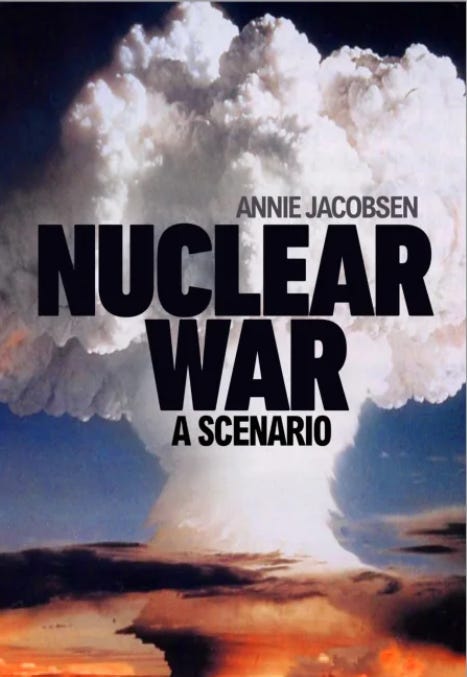Nuclear war and ozone
Bad news for UV risk (but perhaps the least of our worries) ...
Just a short one this time …
A journo reader, George Driver, wondered whether there was any truth in the statement he heard during an interview on Radio New Zealand, that “ … a nuclear war could destroy the ozone layer”. He suggested that other readers might be interested too. Thanks George! I agree.
The person being interviewed was the author of the book below.
Unfortunately, the answer is a qualified ‘yes’. According to a (reputable) paper published about 4 years ago, nuclear war would temporarily destroy ozone.
Quite apart from the immediate widespread death and destruction and ongoing issues with nuclear fallout, that would also be bad news for the surviving population’s rates of skin cancer caused by the excess UV radiation.
But not all of the ozone would be destroyed. You can never destroy all of it because it’s continuously being regenerated by sunlight breaking apart oxygen molecules, then those oxygen atoms recombining with oxygen molecules to form more ozone (O + O2 → O3).
Message for substack. Great that those subscripts, as copied from a word document, now work. Thank you. Well done!
Atmospheric scientists call that ozone regeneration ‘self-healing’. If ozone isn’t produced at the usual upper levels of the atmosphere, UV radiation in sunlight will penetrate further down into the atmosphere. At those levels, there’s even more oxygen, so ozone will again be produced in the same way. As long as there’s oxygen in the atmosphere and UV from sunlight there’ll be some ozone.
I’m a bit surprised that they say in the paper that up to seventy five percent of the ozone could be lost. In that case, there would have to be huge amounts of cloud and ash lasting for years in the upper atmosphere. Thankfully, that would also effectively block a lot of the UV radiation (and radiation at all other wavelengths too). The authors do attempt to calculate the effects on UV, but there will be huge uncertainties on those estimates because they can only guess at the composition and optical properties of the aerosols. Their sobering results critically depend on how high the ash rises into the atmosphere. The radiation blocking at longer wavelengths would lead to devastatingly large reductions in agricultural productivity too, as plants need sunlight to grow, though on the ‘plus’ side there would be far fewer people to feed.
The paper is four years old now, and I haven’t yet seen any further discussion on it. Personally, I think the temporary ozone reduction would be the least of our worries. Unlike the deadly radiation from nuclear fallout that would pervade all spaces for years, it’s easy to protect yourself from UV in sunlight.
On the brighter side, there would a temporary respite for climate change.
But sadly, we probably won’t be here to appreciate it. ☹


I could understand this one!